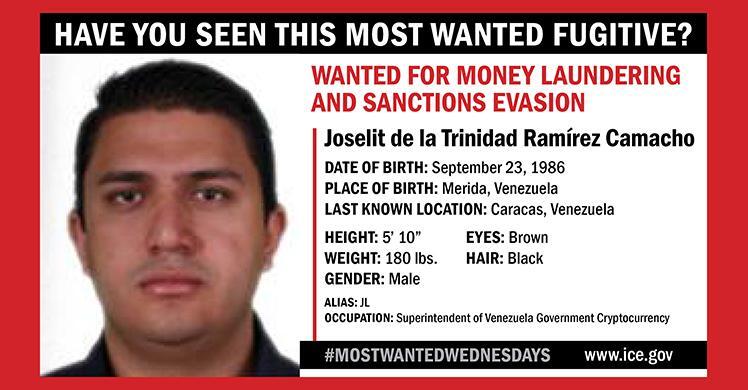The U.S. government has put a $5 million bounty on the head of the Superintendent of Venezuela Government Cryptocurrency. Joselit Ramirez Camacho is charged with two other men, El Assami and Samark Jose Lopez Bello, that are being accused of violating eight counts of U.S. sanctions, money laundering, and violating the Foreign Narcotics Kingpin Designation Act.
In the official statement by ICE, (U.S. Immigration and Customs Enforcement) the “Ramirez Camacho currently serves as Venezuela’s superintendent of cryptocurrency and has been indicted in the Southern District of New York for violations of the International Emergency Economic Powers Act, the Kingpin Act, and other sanctions imposed by the U.S. Treasury Department’s Office of Foreign Asset Control (OFAC).”
What is Petro?
Petro was first introduced to Venezuela by Nicolas Maduro in December of 2017. It was supposed to help back Venezuela’s reserves of oil, gold, diamonds and gasoline, as well as help advance monetary sovereignty. The Venezuelan bolivar has a falling value and the country having $140 billion in foreign debt.
Soon after the launch, the backlash started. First, with Venezuela’s National Assembly, headed by the opposition Democratic Unity Roundtable, declaring that Petro is an illegal debt issuance by a government desperate for cash, and has said it will not recognize it.
Currently, there have been several months of fuel shortage in Venezuela. This is due to financial sanctions that have been imposed by the Trump Administration. After receiving several shipments of gasoline from Iran, the Venezuelan government has stopped subsidizing gasoline for its citizens. It now costs around 2.5 cents per liter. Venezuelans will be able to pay for gas using the states cryptocurrency, Petro, which has stirred up a lot of controversy in Venezuela. Reasons being that the wallets and systems that are in place don’t really work.
Venezuela is suffering from hyperinflation and a shortage of basic food and medicine due to the failed economic policies of the regime of President Nicholas Maduro. The U.S. and other governments claim Maduro stole the May 2018 election and do not recognize his government as legitimate.
Ramirez has been the head of Venezuela’s crypto department since June 2018.





